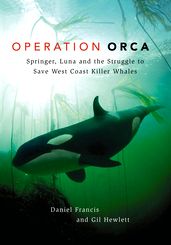Springer, Luna and the Struggle to Save West Coast Killer Whales

Chronologies
Introduction
1. Finding Springer
2. The Gold Rush
3. Rescuing Springer
4. The Homecoming
5. At Home in the Wild
6. Luna
7. Planning for Relocation
8. Standoff at Gold River
9. Conclusion
Winner of Foreword Magazine’s Best Nature Non-Fiction Award.
In 1964 when the Vancouver Aquarium obtained its first killer whale, Moby Doll, the prevalent attitudes towards killer whales was that they were fierce and vicious man-eaters. Over the years, attitudes have begun to change, and orcas are now revered as loveable, intelligent creatures and iconic symbols of the marine environment.
In January 2002, a young killer whale was discovered alone in the waters of Puget Sound near Seattle. Determining that the whale would not survive alone so far from home, a team of scientists captured "Springer" and transported her by boat north to her home range where she rejoined her family.
At the same time Springer was making her historic journey, another lone whale turned up in Nootka Sound on the west coast of Vancouver Island. The people of Nootka Sound adopted "Luna" as their own, but he was a large, boisterous youngster who liked to cuddle boats and the government feared he would get into trouble. Another rescue was planned to return Luna to his family but this time there was no happy ending.
In Operation Orca, winner of the 2008 Foreword Magazine Nature Book of the Year award, author Daniel Francis and long-time Vancouver Aquarium staff member Gil Hewlett give breadth to the complications, contradictions, and political posturing that twice engulfed the debate of whether to interfere or let nature take its course. Through the amazing story of these two "orphan" whales, Operation Orca tells the larger story of orcas in the Pacific Northwest, the people who have studied them and the transformation of the whale's image from killer to icon.
"Operation Orca presents a wonderful opportunity to learn more about killer whales and mankind's attempts to intervene. In the main, it's about people reaching out to save a life in a grand humanitarian gesture." - North Island Midweek